集合名词 collective nouns
Unit2 Noun 名词

Today is September 10th. It’s Day. Let’s go and buy some flowers for our teachers. A. Teachers B. Teachers’ C. the Teachers’ D. Teacher’s
There are few in the fridge. Let’s go and buy some peas, carrots and cabbages. A. vegetables B. fruit C. meat D. eggs
例题解析
We had something to write down and asked me for . A. a paper B. some papers C. some pieces of papers D. a piece of paper
Mrs. Green is mother. A. Mary and Kate B. Mary’s and Kate’s C. Mary’s and Kate D. Mary and Kate’s
可数名词及其复数形式
不规则变化: man-men, woman-women, EnglishmanEnglishmen, policeman-policemen, foot-feet, tooth-teeth, child-children, mouse-mice 单复数相同的名词:sheep, dear 集合名词:people, police, cattle 只有复数的名词:trousers, glasses, thanks, clothes, goods, stairs, chopsticks 以-ese结尾表某国人的名词: two Chinese, three Japanese, Americans, Asians, Australians, Germans
名词
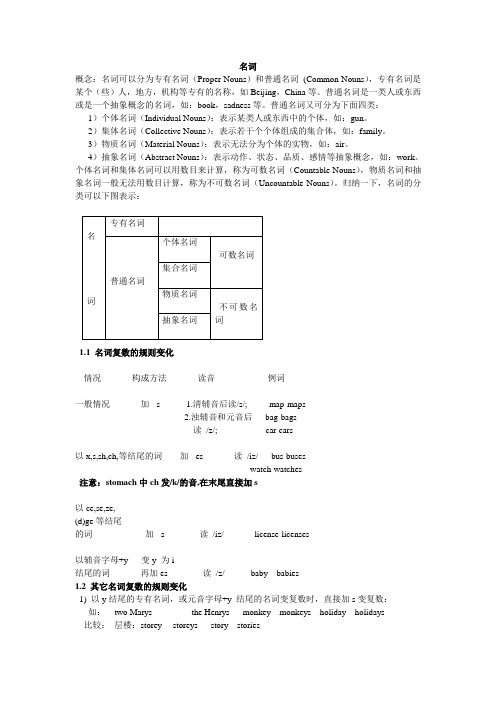
名词概念:名词可以分为专有名词(Proper Nouns)和普通名词(Common Nouns),专有名词是某个(些)人,地方,机构等专有的名称,如Beijing,China等。
普通名词是一类人或东西或是一个抽象概念的名词,如:book,sadness等。
普通名词又可分为下面四类:1)个体名词(Individual Nouns):表示某类人或东西中的个体,如:gun。
2)集体名词(Collective Nouns):表示若干个个体组成的集合体,如:family。
3)物质名词(Material Nouns):表示无法分为个体的实物,如:air。
4)抽象名词(Abstract Nouns):表示动作、状态、品质、感情等抽象概念,如:work。
个体名词和集体名词可以用数目来计算,称为可数名词(Countable Nouns),物质名词和抽象名词一般无法用数目计算,称为不可数名词(Uncountable Nouns)。
归纳一下,名词的分类可以下图表示:1.1名词复数的规则变化_______________________________________________情况构成方法读音例词__________________________________________________一般情况加-s 1.清辅音后读/s/;map-maps2.浊辅音和元音后bag-bags读/z/;car-cars___________________________________________________以x,s,sh,ch,等结尾的词加-es读/iz/bus-buseswatch-watches注意:stomach中ch发/k/的音,在末尾直接加s___________________________________________________以ce,se,ze,(d)ge等结尾的词加-s读/iz/license-licenses___________________________________________________以辅音字母+y变y 为i结尾的词再加es读/z/baby---babies1.2 其它名词复数的规则变化1) 以y结尾的专有名词,或元音字母+y 结尾的名词变复数时,直接加s变复数:如:two Marys the Henrys monkey---monkeys holiday---holidays比较:层楼:storey ---storeys story---stories2) 以o 结尾的名词,除有生命的“两个两物”(Negro, hero, potato, tomato)加es外,其余名词直接加s 如:photo---photos piano---pianos radio---radios zoo---zoos;如:zero---zeros / zeroes3) 以f或fe 结尾的名词变复数时:a. 直接加s,如:beliefs/roofs/safes/gulfs/cliffs/proofs/chiefs/reefs/serfs/海湾边,屋顶上,首领奴仆两相望谁说他们无信仰,证据写在手帕上b. 变f或fe为v加es,如:thieves/wives/lives/shelves/knives/leaves/wolves/halves小偷之妻生活难,自己扫叶来做饭忽见一狼藏架后,取刀把它劈两半knife---knives leaf---leaves wolf---wolves wife---wives life---lives thief---thieves;c. 均可,如:handkerchiefs / handkerchieves4) 有主体名词的复合词,将主体名词变成复数Looker(s)-on旁观者/step-sons/son(s)-in-law/passer(s)-by/editor(s)-in-chief/comrade(s)-in-arms 注意:无主体的复合词,在词尾直接加s.如:grown-ups/go-betweens/has-beens/film-goers 1.3 名词复数的不规则变化1) 改变单数名词内部元音的不规则变化man---men woman---women foot---feet tooth---teeth mouse---mice goose—geese louse---lice(child---children)由man和woman 构成的复合名词policeman ——policeman policewoman ——policewomangentleman ——gentleman chairwoman ——chairwomen2) 外来词的不规则复数形式analysis ——analyses /-si:z / 分析basis ——bases /-si:z / 基础crisis ——crises /-si:z / 危机criterion ——criteria 标准medium ——media 媒体phenomenon ——phenomena 现象stratum ——strata 阶层thesis ——theses /-si:z/ 论文datum-------data 数据bacterium-----bacteria 细菌oasis-----oases 绿洲3)定语名词的复数名词作定语一般用单数,但也有以下例外。
名词的定义
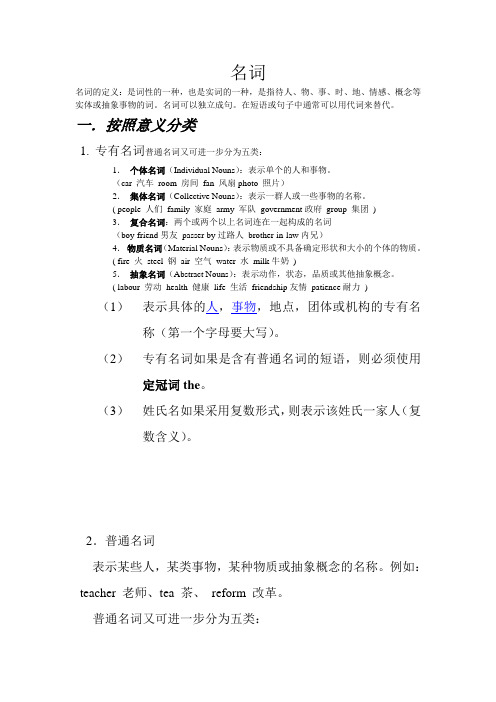
名词名词的定义:是词性的一种,也是实词的一种,是指待人、物、事、时、地、情感、概念等实体或抽象事物的词。
名词可以独立成句。
在短语或句子中通常可以用代词来替代。
一.按照意义分类1.专有名词普通名词又可进一步分为五类:1.个体名词(Individual Nouns):表示单个的人和事物。
(car 汽车room 房间fan 风扇photo 照片)2.集体名词(Collective Nouns):表示一群人或一些事物的名称。
( people 人们family 家庭army 军队government政府group 集团)3.复合名词:两个或两个以上名词连在一起构成的名词(boy-friend男友passer-by过路人brother-in-law内兄)4.物质名词(Material Nouns):表示物质或不具备确定形状和大小的个体的物质。
( fire 火steel 钢air 空气water 水milk牛奶)5.抽象名词(Abstract Nouns):表示动作,状态,品质或其他抽象概念。
( labour 劳动health 健康life 生活friendship友情patience耐力)(1)表示具体的人,事物,地点,团体或机构的专有名称(第一个字母要大写)。
(2)专有名词如果是含有普通名词的短语,则必须使用定冠词the。
(3)姓氏名如果采用复数形式,则表示该姓氏一家人(复数含义)。
2.普通名词表示某些人,某类事物,某种物质或抽象概念的名称。
例如:teacher 老师、tea 茶、reform 改革。
普通名词又可进一步分为五类:1.个体名词(Individual Nouns):表示单个的人和事物。
2.集体名词(Collective Nouns):表示一群人或一些事物的名称。
3.复合名词:两个或两个以上名词连在一起构成的名词4.物质名词(Material Nouns):表示物质或不具备确定形状和大小的个体的物质。
英语集体名词的概念

英语集体名词的概念
英语中的集体名词(Collective Nouns)是指用来表示一组人或物的单数名词。
这些名词通常指代一个整体,虽然它们所代表的实际成员可能是复数形式。
集体名词可以用于描述一群人的集合,如“team”(团队)、“family”(家庭)、“class”(班级),或者描述一批物品,如“furniture”(家具)、“clothing”(衣物)。
在英语中,集体名词的动词形式通常遵循主谓一致的原则。
如果强调的是群体作为一个整体,则使用单数动词;如果强调的是群体中的个体,则使用复数动词。
例如:
•The team is playing well. (强调整个团队的表现)
•The team are arguing with each other. (强调团队中的个别成员之间的争论)
值得注意的是,并非所有的集体名词都具有明确的个体化倾向,有些词汇更倾向于被视为不可分割的整体,因此总是与单数动词搭配。
这主要取决于具体的语境和作者的意图。
记住,英语语法规则可能因地区和语体的不同而有所差异,所以重要的是要熟悉你的目标受众所习惯的用法。
英语语法知识点详解Collective Nouns
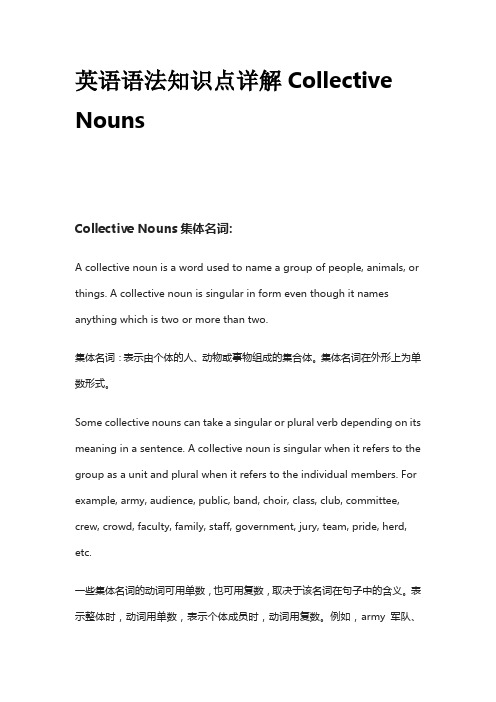
英语语法知识点详解Collective NounsCollective Nouns集体名词:A collective noun is a word used to name a group of people, animals, or things. A collective noun is singular in form even though it names anything which is two or more than two.集体名词:表示由个体的人、动物或事物组成的集合体。
集体名词在外形上为单数形式。
Some collective nouns can take a singular or plural verb depending on its meaning in a sentence. A collective noun is singular when it refers to the group as a unit and plural when it refers to the individual members. For example, army, audience, public, band, choir, class, club, committee, crew, crowd, faculty, family, staff, government, jury, team, pride, herd, etc.一些集体名词的动词可用单数,也可用复数,取决于该名词在句子中的含义。
表示整体时,动词用单数,表示个体成员时,动词用复数。
例如,army军队、audience观众、public公众、band乐队、choir合唱团、class班级、club俱乐部、committee委员会、crew全体工作人员、crowd人群、faculty全体教职工、family家、staff全体职工、government政府、jury陪审团、team 队、pride狮群、herd牧群。
集体名词的数

a
10
thank you for listening
a
5
• 强调:
• 把一个集体名词看作单数或复数,要注意前后一致。如: • The team is famous for its(不能用their) long history. • 该队以历史悠久而闻名。 • He has joined the football team who are (不可用which is)
• 2.At the moment,the whole class __is enjoying __(enjoy)sightseeing trips in the city.
• 3.My study group__want__(want)to have pen friend. • 4.Our team_ has __ (have)organized a match against a
a
8
• 2.a quantity of +名词,分数、百分数做主语,谓语单复数 由名词定。
• 3. a number of ,a variety of, a group of +复数名词+复数 谓语
• 4. the number of ,the variety of+.In summer,my family always _e_ats _(eat) lunch in the park.
它们指同一类的许多东西,其用法与不可数名词相当: 1.形式上总是单数,没有复数形式。作主语时,谓语用单 数。 如:The old machinery is out of date.
a
2
2.不可直接与a或an或数词连用。表数量时用much,little, some,a piece of,an article of,a set of等。 如: Each room has five pieces of furniture.
高中英语真题-名词
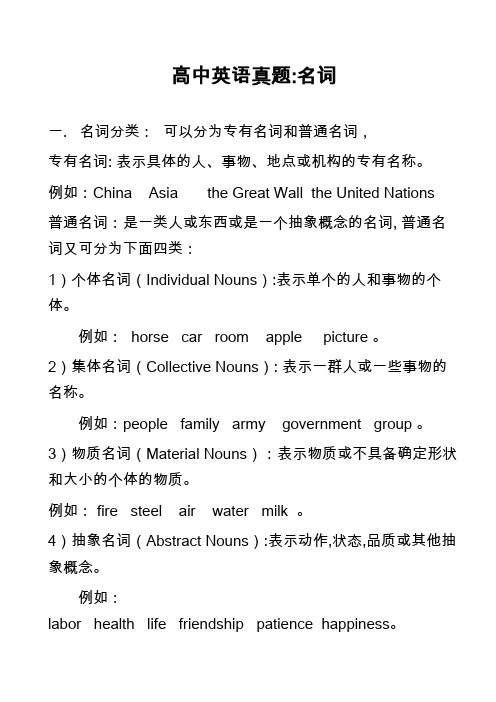
高中英语真题:名词一. 名词分类:可以分为专有名词和普通名词,专有名词: 表示具体的人、事物、地点或机构的专有名称。
例如:China Asia the Great Wall the United Nations普通名词:是一类人或东西或是一个抽象概念的名词, 普通名词又可分为下面四类:1)个体名词(Individual Nouns):表示单个的人和事物的个体。
例如: horse car room apple picture 。
2)集体名词(Collective Nouns): 表示一群人或一些事物的名称。
例如:people family army government group 。
3)物质名词(Material Nouns):表示物质或不具备确定形状和大小的个体的物质。
例如: fire steel air water milk 。
4)抽象名词(Abstract Nouns):表示动作,状态,品质或其他抽象概念。
例如:labor health life friendship patience happiness。
个体名词和集体名词可以用数目来计算,称为可数名词,物质名词和抽象名词一般无法用数目计算,称为不可数名词。
二、英语中名词的数一)规则变化:名词的复数形式,一般在单数形式后面加-s或-es:1 一般情况在词尾加-s . map---maps, sea----seas, girl----girls, day---days monkey--monkeys2 以s, x, ch, sh结尾的名词后加-es. class----classes, box----boxes, watch----watches, dish----dishes但 ch发音为 /k/ 的直接加s : stomach---stomachs3. 以辅音字母加y结尾的名词,变yi-esparty---parties, family---families, story---stories, city---cities4. 以元音字母加y结尾的名词,或专有名词以y结尾加sToy---toys, boy---boys, day---days, ray---rays, Henry---Henrys5. 以-f或-fe结尾的词变-f和-fe为v再加-es leaf---leaves, knife---knives, wife---wives但下列词直接加s: thief、gulf、 roof、 serf、 chief、belief、proof、safe注意: handkerchief、scarf两种形式均可。
public构词法

public构词法【原创实用版】目录1.公共名词 (Public nouns)2.形容词 (Adjectives)3.动词 (Verbs)4.副词 (Adverbs)5.介词 (Prepositions)6.代词 (Pronouns)7.连词 (Conjunctions)8.感叹词 (Interjections)9.数词 (Numerals)10.集合名词 (Collective nouns)正文“public”这个词的构词法非常有趣,它是由不同的词性组合而成的。
让我们一起来看看这些词性是如何构成“public”的。
1.公共名词 (Public nouns):这是“public”最基本的词性,表示“公众的”或“公开的”。
例如,“public opinion”(公众意见)和“public transport”(公共交通)。
2.形容词 (Adjectives):形容词用于描述名词,而“public”也可以作为形容词使用。
例如,“public library”(公共图书馆)和“public park”(公园)。
3.动词 (Verbs):动词表示动作或状态,而“public”也可以作为动词使用。
例如,“to publicize”(公开)和“to go public”(公开)。
4.副词 (Adverbs):副词用于修饰动词、形容词或其他副词,而“public”也可以作为副词使用。
例如,“publicly”(公开地)和“to publicize”(公开)。
5.介词 (Prepositions):介词用于引导短语,而“public”也可以作为介词使用。
例如,“in public”(在公共场合)和“to the public”(对公众)。
6.代词 (Pronouns):代词用于替代名词,而“public”也可以作为代词使用。
例如,“the public”(公众)和“public opinion”(公众意见)。
7.连词 (Conjunctions):连词用于连接词、短语或句子,而“public”也可以作为连词使用。
英语的集合名词
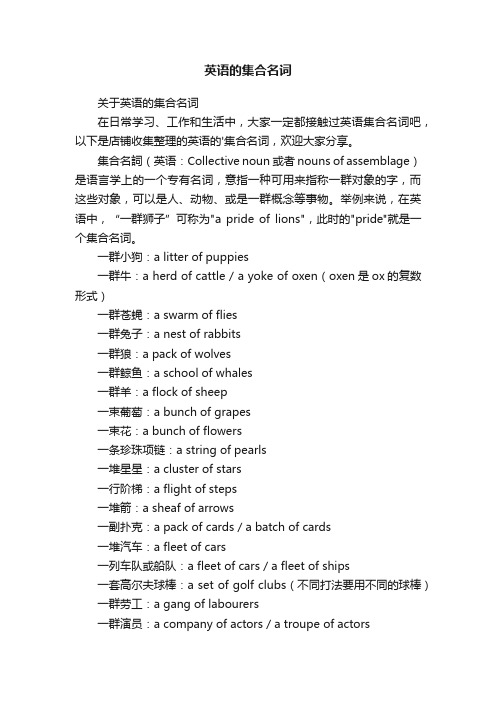
英语的集合名词关于英语的集合名词在日常学习、工作和生活中,大家一定都接触过英语集合名词吧,以下是店铺收集整理的英语的'集合名词,欢迎大家分享。
集合名詞(英语:Collective noun或者nouns of assemblage)是语言学上的一个专有名词,意指一种可用来指称一群对象的字,而这些对象,可以是人、动物、或是一群概念等事物。
举例来说,在英语中,“一群狮子”可称为"a pride of lions",此时的"pride"就是一个集合名词。
一群小狗:a litter of puppies一群牛:a herd of cattle / a yoke of oxen(oxen是ox的复数形式)一群苍蝇:a swarm of flies一群兔子:a nest of rabbits一群狼:a pack of wolves一群鲸鱼:a school of whales一群羊:a flock of sheep一束葡萄:a bunch of grapes一束花:a bunch of flowers一条珍珠项链:a string of pearls一堆星星:a cluster of stars一行阶梯:a flight of steps一堆箭:a sheaf of arrows一副扑克:a pack of cards / a batch of cards一堆汽车:a fleet of cars一列车队或船队:a fleet of cars / a fleet of ships一套高尔夫球棒:a set of golf clubs(不同打法要用不同的球棒)一群劳工:a gang of labourers一群演员:a company of actors / a troupe of actors一群水手:a crew of sailors一群佣人:a staff of servants一群士兵:a squadron of soldiers / a troop of soldiers / a squad of soldiers / a detail of soldiers / a party of soldiers (都指一群士兵,要根据兵种及兵团大小来选择不同的量词)【关于英语的集合名词】。
高中英语语法总结大全

高中英语语法总结大全之名词名词概论名词可以分为专有名词(Proper Nouns)和普通名词(Common Nouns),专有名词是某个(些)人,地方,机构等专有的名称,如Beijing,China等。
普通名词是一类人或东西或是一个抽象概念的名词,如:book,sadness等。
普通名词又可分为下面四类:1)个体名词(Individual Nouns):表示某类人或东西中的个体,如:gun。
2)集体名词(Collective Nouns):表示若干个个体组成的集合体,如:family。
3)物质名词(Material Nouns):表示无法分为个体的实物,如:air。
4)抽象名词(Abstract Nouns):表示动作、状态、品质、感情等抽象概念,如:work。
个体名词和集体名词可以用数目来计算,称为可数名词(Countable Nouns),物质名词和抽象名词一般无法用数目计算,称为不可数名词(Uncountable Nouns)。
归纳一下,名词的分类可以下图表示:名词复数的规则变化其它名词复数的规则变化1) 以y结尾的专有名词,或元音字母+y 结尾的名词变复数时,直接加s变复数:如:two Marys the Henrysmonkey---monkeysholiday---holidays比较:层楼:storey ---storeysstory---stories2) 以o 结尾的名词,变复数时:a. 加s,如:photo---photospiano---pianosradio---radioszoo---zoos;b. 加es,如:potato--potatoestomato—tomatoesc. 均可,如:zero---zeros / zeroes3) 以f或fe 结尾的名词变复数时:a. 加s,如:belief---beliefsroof---roofssafe---safesgulf---gulfs;b. 去f,fe 加ves,如:half---halvesknife---knivesleaf---leaveswolf---wolveswife---wiveslife---livesthief---thieves;c. 均可,如:handkerchief:handkerchiefs / handkerchieves名词复数的不规则变化1)child---childrenfoot---feettooth---teethmouse---miceman---menwoman---women注意:与man 和woman构成的合成词,其复数形式也是-men 和-women。
高中英语语法总结大全

高中英语语法总结大全之名词名词概论名词可以分为专有名词(Proper Nouns)和普通名词(Common Nouns),专有名词是某个(些)人,地方,机构等专有的名称,如Beijing,China等。
普通名词是一类人或东西或是一个抽象概念的名词,如:book,sadness等。
普通名词又可分为下面四类:1)个体名词(Individual Nouns):表示某类人或东西中的个体,如:gun。
2)集体名词(Collective Nouns):表示若干个个体组成的集合体,如:family。
3)物质名词(Material Nouns):表示无法分为个体的实物,如:air。
4)抽象名词(Abstract Nouns):表示动作、状态、品质、感情等抽象概念,如:work。
个体名词和集体名词可以用数目来计算,称为可数名词(Countable Nouns),物质名词和抽象名词一般无法用数目计算,称为不可数名词(Uncountable Nouns)。
归纳一下,名词的分类可以下图表示:名词复数的规则变化其它名词复数的规则变化1) 以y结尾的专有名词,或元音字母+y 结尾的名词变复数时,直接加s变复数:如:two Marys the Henrysmonkey---monkeysholiday---holidays比较:层楼:storey ---storeysstory---stories2) 以o 结尾的名词,变复数时:a. 加s,如:photo---photospiano---pianosradio---radioszoo---zoos;b. 加es,如:potato--potatoestomato—tomatoesc. 均可,如:zero---zeros / zeroes3) 以f或fe 结尾的名词变复数时:a. 加s,如:belief---beliefsroof---roofssafe---safesgulf---gulfs;b. 去f,fe 加ves,如:half---halvesknife---knivesleaf---leaveswolf---wolveswife---wiveslife---livesthief---thieves;c. 均可,如:handkerchief:handkerchiefs / handkerchieves名词复数的不规则变化1)child---childrenfoot---feettooth---teethmouse---miceman---menwoman---women注意:与man 和woman构成的合成词,其复数形式也是-men 和-women。
专四语法考点
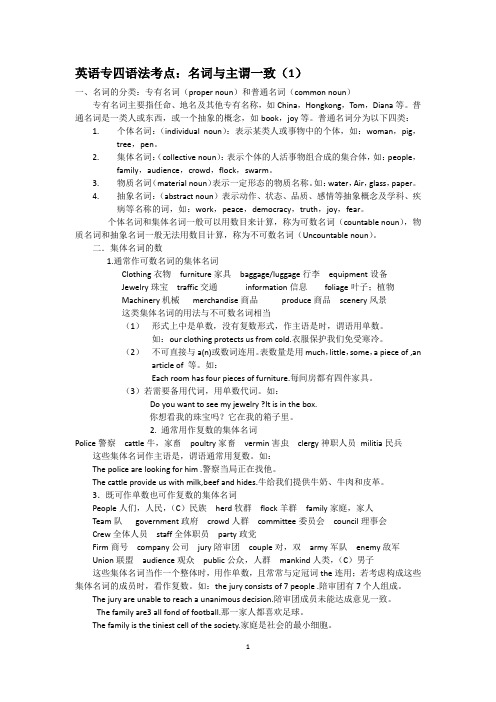
英语专四语法考点:名词与主谓一致(1)一、名词的分类:专有名词(proper noun)和普通名词(common noun)专有名词主要指任命、地名及其他专有名称,如China,Hongkong,Tom,Diana等。
普通名词是一类人或东西,或一个抽象的概念,如book,joy等。
普通名词分为以下四类:1.个体名词:(individual noun):表示某类人或事物中的个体,如:woman,pig,tree,pen。
2.集体名词:(collective noun):表示个体的人活事物组合成的集合体,如:people,family,audience,crowd,flock,swarm。
3.物质名词(material noun)表示一定形态的物质名称。
如:water,Air,glass,paper。
4.抽象名词:(abstract noun)表示动作、状态、品质、感情等抽象概念及学科、疾病等名称的词,如:work,peace,democracy,truth,joy,fear。
个体名词和集体名词一般可以用数目来计算,称为可数名词(countable noun),物质名词和抽象名词一般无法用数目计算,称为不可数名词(Uncountable noun)。
二.集体名词的数1.通常作可数名词的集体名词Clothing衣物furniture家具baggage/luggage行李equipment设备Jewelry珠宝traffic交通information信息foliage叶子;植物Machinery机械merchandise商品produce商品scenery风景这类集体名词的用法与不可数名词相当(1)形式上中是单数,没有复数形式,作主语是时,谓语用单数。
如:our clothing protects us from cold.衣服保护我们免受寒冷。
(2)不可直接与a(n)或数词连用。
表数量是用much,little,some,a piece of ,an article of 等。
2 Nouns(名词)
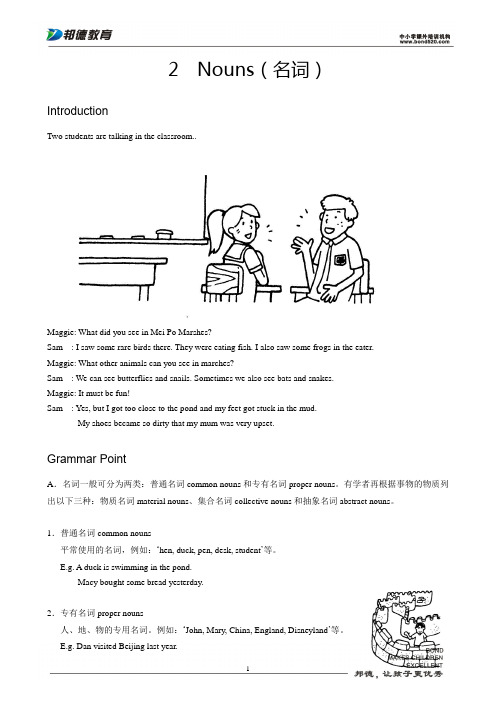
IntroductionTwo students are talking in the classroom..Maggie: What did you see in Mei Po Marshes?Sam : I saw some rare birds there. They were eating fish. I also saw some frogs in the eater.Maggie: What other animals can you see in marches?Sam : We can see butterflies and snails. Sometimes we also see bats and snakes.Maggie: It must be fun!Sam : Yes, but I got too close to the pond and my feet got stuck in the mud.My shoes became so dirty that my mum was very upset.Grammar PointA.名词一般可分为两类:普通名词common nouns和专有名词proper nouns。
有学者再根据事物的物质列出以下三种:物质名词material nouns、集合名词collective nouns和抽象名词abstract nouns。
1.普通名词common nouns平常使用的名词,例如:‘hen, duck, pen, desk, student’等。
E.g. A duck is swimming in the pond.Macy bought some bread yesterday.2.专有名词proper nouns人、地、物的专用名词。
例如:‘John, Mary, China, England, Disneyland’等。
新高考英语整理大全—名词
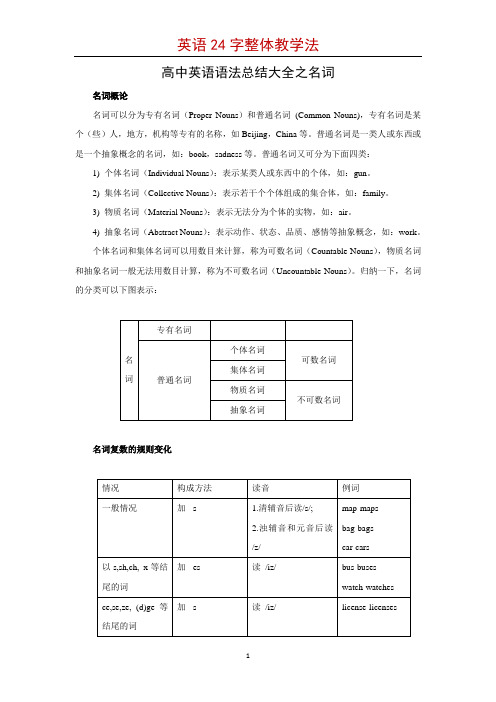
高中英语语法总结大全之名词名词概论名词可以分为专有名词(Proper Nouns)和普通名词(Common Nouns),专有名词是某个(些)人,地方,机构等专有的名称,如Beijing,China等。
普通名词是一类人或东西或是一个抽象概念的名词,如:book,sadness等。
普通名词又可分为下面四类:1)个体名词(Individual Nouns):表示某类人或东西中的个体,如:gun。
2)集体名词(Collective Nouns):表示若干个个体组成的集合体,如:family。
3)物质名词(Material Nouns):表示无法分为个体的实物,如:air。
4)抽象名词(Abstract Nouns):表示动作、状态、品质、感情等抽象概念,如:work。
个体名词和集体名词可以用数目来计算,称为可数名词(Countable Nouns),物质名词和抽象名词一般无法用数目计算,称为不可数名词(Uncountable Nouns)。
归纳一下,名词的分类可以下图表示:名词复数的规则变化其它名词复数的规则变化1) 以y结尾的专有名词,或元音字母+y 结尾的名词变复数时,直接加s变复数:如:two Marys the Henrysmonkey---monkeysholiday---holidays比较:层楼:storey ---storeysstory---stories2) 以o 结尾的名词,变复数时:a. 加s,如:photo---photospiano---pianosradio---radioszoo---zoos;b. 加es,如:potato--potatoestomato—tomatoesc. 均可,如:zero---zeros / zeroes3) 以f或fe 结尾的名词变复数时:a. 加s,如:belief---beliefsroof---roofssafe---safesgulf---gulfs;b. 去f,fe 加ves,如:half---halvesknife---knivesleaf---leaveswolf---wolveswife---wiveslife---livesthief---thieves;c. 均可,如:handkerchief:handkerchiefs / handkerchieves名词复数的不规则变化1)child---childrenfoot---feettooth---teethmouse---miceman---menwoman---women注意:与man 和woman构成的合成词,其复数形式也是-men 和-women。
英语语法集合名词
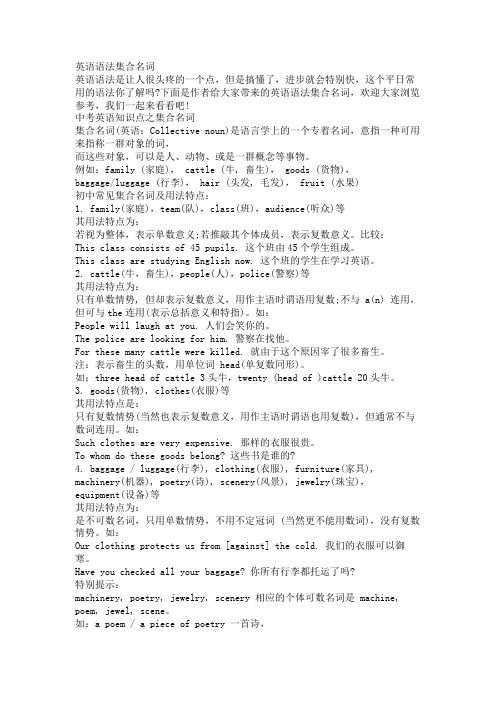
英语语法集合名词英语语法是让人很头疼的一个点,但是搞懂了,进步就会特别快,这个平日常用的语法你了解吗?下面是作者给大家带来的英语语法集合名词,欢迎大家浏览参考,我们一起来看看吧!中考英语知识点之集合名词集合名词(英语:Collective noun)是语言学上的一个专着名词,意指一种可用来指称一群对象的词,而这些对象,可以是人、动物、或是一群概念等事物。
例如:family (家庭), cattle (牛, 畜生), goods (货物),baggage/luggage (行李), hair (头发, 毛发), fruit (水果)初中常见集合名词及用法特点:1. family(家庭),team(队),class(班),audience(听众)等其用法特点为:若视为整体,表示单数意义;若推敲其个体成员,表示复数意义。
比较:This class consists of 45 pupils. 这个班由45个学生组成。
This class are studying English now. 这个班的学生在学习英语。
2. cattle(牛,畜生),people(人),police(警察)等其用法特点为:只有单数情势, 但却表示复数意义,用作主语时谓语用复数;不与 a(n) 连用,但可与the连用(表示总括意义和特指)。
如:People will laugh at you. 人们会笑你的。
The police are looking for him. 警察在找他。
For these many cattle were killed. 就由于这个原因宰了很多畜生。
注:表示畜生的头数,用单位词 head(单复数同形)。
如:three head of cattle 3头牛,twenty (head of )cattle 20头牛。
3. goods(货物), clothes(衣服)等其用法特点是:只有复数情势(当然也表示复数意义,用作主语时谓语也用复数),但通常不与数词连用。
高三名词知识点总结大全
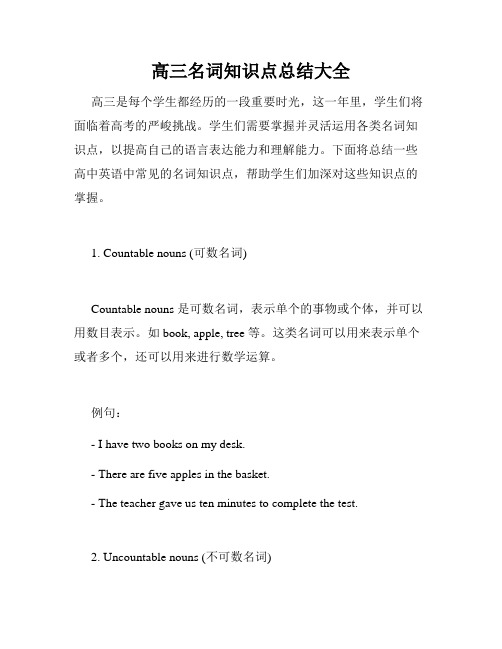
高三名词知识点总结大全高三是每个学生都经历的一段重要时光,这一年里,学生们将面临着高考的严峻挑战。
学生们需要掌握并灵活运用各类名词知识点,以提高自己的语言表达能力和理解能力。
下面将总结一些高中英语中常见的名词知识点,帮助学生们加深对这些知识点的掌握。
1. Countable nouns (可数名词)Countable nouns 是可数名词,表示单个的事物或个体,并可以用数目表示。
如 book, apple, tree 等。
这类名词可以用来表示单个或者多个,还可以用来进行数学运算。
例句:- I have two books on my desk.- There are five apples in the basket.- The teacher gave us ten minutes to complete the test.2. Uncountable nouns (不可数名词)Uncountable nouns 是不可数名词,表示不可分割的事物、物质或抽象概念。
如water, milk, love 等。
这类名词通常没有复数形式,不能用来表示具体的数目。
例句:- I drink water every day.- Can you pass me some milk?- Love is a beautiful thing.3. Collective nouns(集合名词)Collective nouns 是表示一组人或事物的名词。
如 family, team, class 等。
这类名词在语法上可以用作单数或复数形式,取决于指的是整体还是其中的个体成员。
例句:- My family is going on vacation next week.- The team are practicing for the competition.- Our class is the best in the school.4. Proper nouns (专有名词)Proper nouns 是特指某个人、地方或事物的名词。
名词用英语怎么说

名词用英语怎么说名词是词类的一种,属于实词,名词表示人、事物、地点或抽象概念的名称,名词同时也分为专有名词和普通名词。
那么你知道名词用英语怎么说吗?下面来学习一下吧。
名词英语说法1:noun名词英语说法2:substantive名词的相关短语:集合名词 collective noun ; Term of venery ; English collective noun ; Group noun物质名词 Material Nouns ; mass noun ; Stoffnamen ; Material terms名词从句 Noun Clauses ; nominal clause ; the noun clause ; who can do it名词解释 Glossary ; SMT ; Definitions ; Explain the glossary 具体名词 concret个体名词 individual ; Individual terminology不规则名词 irregular ; heteroclitic ; heteroclite单一名词 one-word noun名称的英语例句:1. The noun " mouse " is the singular form of " mice " .名词mouse是 mice 的单数形式.2. French differs from English in having gender for all nouns.法语不同于英语,所有的名词都有性.3. In " the black cat " the adjective " black " modifies the noun " cat " .在the black cat这一词组中,形容词 black 修饰名词cat.4. Nouns join to form compounds.名词和名词结合构成复合词.5. The word " person " is a countable noun.person 这个词是个可数名词.6. In English, gerunds end in " - ing ".在英语中, 动名词以“ -ing ” 结尾.7. English nouns are not usually inflected.英语名词通常没有屈折变化.8. We can form nouns from adjectives.我们可以用形容词来构成名词.9. Attributive adjectives precede the noun.定语形容词位于名词前.10. An attributive noun functions as an adjective.定语性名词起形容词作用.11. The noun is followed by an intransitive verb.这个名词后接不及物动词.12. Predicative adjectives follow the noun.表语形容词放在名词后面.13. Abstract nouns are usually uncountable nouns in English. 英语中的抽象名词通常是不可数名词.14. The noun is in the singular.这个名词是单数形式.15. These cakes are five cents apiece.这些烧饼5美分一个。
- 1、下载文档前请自行甄别文档内容的完整性,平台不提供额外的编辑、内容补充、找答案等附加服务。
- 2、"仅部分预览"的文档,不可在线预览部分如存在完整性等问题,可反馈申请退款(可完整预览的文档不适用该条件!)。
- 3、如文档侵犯您的权益,请联系客服反馈,我们会尽快为您处理(人工客服工作时间:9:00-18:30)。
• 4. 以-ings结尾的名词,常用复数,但也有 例外
• belongs, bookings, surroundings, sweepings(垃圾), takings (收入), clipping (剪下物),findings
• The findings of the court have now been made public.
• majority, public • team (队), • class (班), • audience (听众)等
英语集合名词用法分类
• 其用法特点为:若视为整体,表示单数意义;若 考虑其个体成员,表示复数意义。
• 比较并体会: • His family is large. 他的家是个大家庭。 • His family are all waiting for him. 他的一家人都在
• The two companies are United Biscuits and Imperial. United Biscuits are frontrunners in the food market and expanding fast. Imperial are leaders in the food and tobacco market.
• Type 2 形式为单数,但意义永远为复数这类集合 名词包括
• cattle (牛,牲畜) • poultry (家禽) • vermin (害鼠,害鸟 如:鼠,狐,猫头鹰) • people (人), • militia (民兵,国民自卫队) • police(警察)等
• 其用法特点为:只有单数形式, 但却表示复数意义, 用作主语时谓语用复数;不与 a(n) 连用,但可与 the连用(连用)。如:
某些以-s结尾的名词的数
• 英语中有些以-s结尾的名词,有的作单数, 有的作复数,情况比较复杂。
• 1. 以-ics 结尾的名词 表“学科”时作单数 • Linguistics informatics mathematics
• Physics plastics politics statistics
形)。如:five head of cattle 5头牛,fifty (head of ) cattle 50头牛
• Type 3 形式为复数,意义也为复数这类集合名词包括 goods (货物),
• clothes (衣服)等, • 其用法特点是:只有复数形式, 当然也表示复数意
义,用作主语时谓语也用复数,但通常不与数词 连用。 • Eg.:Clothes dry slowly in the rainy season. 衣 服在雨季不易干。 • Such clothes are very expensive. 那样的衣服很 贵。
• 3. 有两部分构成的物体名称,通常用复数
• Eg. calipers (两脚规), compasses, flares(喇叭裤), forceps, glasses, jeans, pants, pincers, pliers(钳子), scales, scissors, shades(太阳镜), shorts,
• 但是,当要表示种类时,它可视为可数名 词,即a fruit 指一种水果,fruits 指多种水 果。比较:
• Some fruits have thick skins. • 有些水果皮很厚。
• The potato is a vegetable, not a fruit. • 土豆是一种蔬菜,而不是一种水果。
• People will laugh at you. • The police are looking for him. • Many cattle were killed for this. • The militia were called out to guard the
borderland. • Poultry are dear in the city. • These vermin do a lot of harm to poultry. • 注:表示牲畜的头数,用单位词 head(单复数同
• 人们认为唐朝是中国诗歌的全盛时期。
• 注:machinery, poetry, jewelry, scenery等 相应的个体可数名词是 machine, poem, jewel, scene等。
• 如:a poem / a piece of poetry 一首诗 many machines / much machinery / many pieces of machinery 许多机器
• What are his politics( =political views)?
• 2. 以 –s 结尾的疾病名称,一般用单数 • Phlebitis(静脉炎) is inflammation of the
veins. • Shingles(带状疱疹) is serious; how long
some special collective nouns
• 1. hair (头发,毛发) 指全部头发或毛发时,为集合名词(不可数);指 几根头发或毛发时,为个体名词(可数)。
• 如:My hair has grown very long. • 我的头发已长得很长了。 • The police found two hairs there. • 警察在那儿找到了两根头发。
• 2. mankind (人类) 人类是一个不可数的集合名词,不用复数 形式,也不连用冠词。如:
• This is an invention that benefits mankind.
• Mankind has its own problems. • 注:mankind 表示“mankind 人(类)”时,
• The British Airways (英国航空公司)are being modernized.
• The B.B.C(英国广播公司) have broadcast a message in which they have asked a certain Mr Green to go to the Overhill Hospital when doctors are treating his wife after a severe stroke.
• 其用法特点为:是不可数名词,只用单数 形式,不用不定冠词(当然更不能用数词), 没有复数形式。如:
• Our clothing protects us from (against) the cold.
• 我们的衣服可以御寒。
• Have you checked all your baggage? • 你所有的行李都托运了吗?
• 集体名词通常只以单数形式出现,但这种 单数形式有的可作复数用。集体名词在句 中作单数用还是作复数用应根据不同情况 而定。
英语集合名词用法分类
• Type 1 • 形式为单数,但意义可以用为单数或复
数这类集合名词包括: • family (家庭)
• Crew, government, couple,
等他。 • This class consists of 45 pupils. 这个班由45个学
生组成。 • This class are reading English now. 这个班的学
生在读英语。
• The audience is requested to remain seated during intermission.
• The audience have taken seats.
• A married young couple is treated differently than husband or wife is treated alone.
• The young couple were unhappy with the apartment they rented.
has he got it?
• Diabetes is a common disease.
• Indeed, they say, AIDS is spread primae ill.
• Arthritis is a disease causing pain and swelling in the joints of the body.
• If goods are not well made you should complain to the manufacturer. 如果货物质量不好,则理应 向制造商提出控诉。
• Type 4 形式为单数,意义也为单数这类集合名词 包括
• baggage / luggage(行李), • clothing(衣服), • furniture(家具), • machinery(机器), • poetry(诗), • scenery (风景), • Jewelry (珠宝), • equipment(设备)等,
虽不可数,但有时却可以表示复数意义, 尤其是当其表语是复数时。如:
• Mankind are intelligent animals. • 人是理智的动物。
• 3. fruit(水果) 作为集合名词,它通常是不可数的。如: He doesn’t eat much fruit. 他不大吃水果。 He is growing fruit in the country.
• The vast majority of the students needs increased financial support.
• The majority realize that they have no more power than the smallest minorities.
• 5. 以-s结尾的专有名词,常作单数用 • The United States is in the Western
